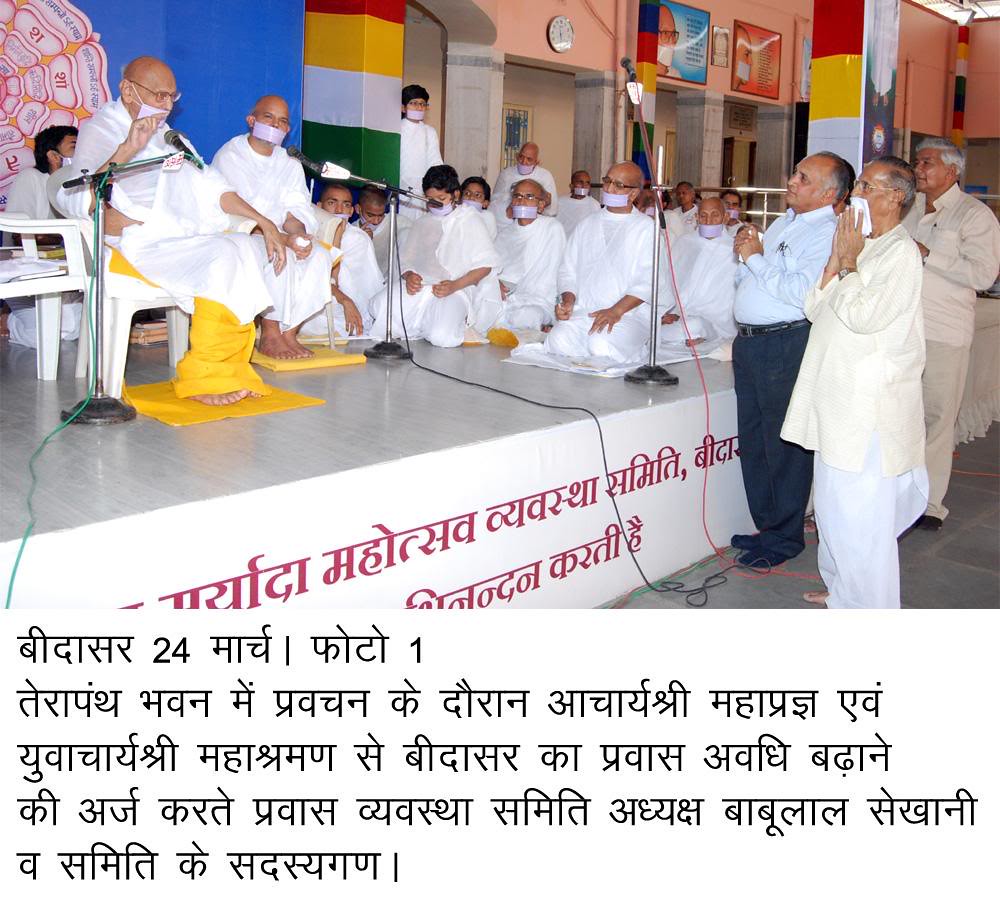JAIN VISHVA BHARATI UNIVERSITY

 Acharya Mahapragya Pravas Samiti 's president Shri Babulal Sekhani along with his team requesting Acharya Shri to extend his Bidasar stay
Acharya Mahapragya Pravas Samiti 's president Shri Babulal Sekhani along with his team requesting Acharya Shri to extend his Bidasar stay
Definition Of Karma In Jaina Philosophy And In Other Philosophies
India is a country in which religion plays a very dominant role. All the ideologies and religions having faith in God have acknowledged karma or some such entity as affects, covers or blunts the various powers of the soul. Different philosophies have given different names instead of karma to that entity.
In Vedānta philosophy it is known as illusion or ignorance.1 According to Sānkhya philosophy it is nature or tradition.2 In Yoga, philosophy the terms 'Karmic purport' or 'tormentation' have been used for it.3 The terms 'providence' and 'tradition' of the Nyāya philosophy stand for karma.4 In Buddhism it is known as 'predisposition' and 'non-communique'.5 The term 'religion and non-religion' used in Vaisesika philosophy is the synonym of the word karma used in Jaina philosophy.6 The word "trap" used in Śaiva philosophy is also a synonym of the word karma. The word "unprecedented" of Mīmānsā philosophy has also been used in the sense of karma.7 There are many words like 'destiny', 'fate', 'virtue' and 'vice' that have been commonly used in many scriptures. In Jaina philosophy, we also find the use of terms like 'karmic filth' and 'karmic dust' along with the word karma.8
At some places in ' Ṛgaveda' the meaning of the word karma has been given as religion rites like yajña, conation etc. Gods accept or like all the karma of the persons who worship and pay homage to them.9 In vedic tradition, right from the Vedas upto the scripture Brahmins, the acts like yajña etc. those were performed daily have been described as karma.10
According to the Smārta scholars, the duties and obligations ascribed to the four classes (Brahmin, Kṣatriya, Vaiśya and Śudra) of the society and for the four Āsṛamas (celibacy, household, vāna prastha and renunciation) have been described as karma.11 In the Gītā, the world karma has been used in a very broad sense. In this scripture, this term denotes a deed performed without the expectation of fruit or result, in an absolute detached manner, with whole - hearted devotion combined with knowledge and skill.12 Defining karma, the famous Jainācārya Devendra Suri13 writes, "The cause of a soul's action is karma". According to another famous Jaina scholar Pandit Sukhlal,14 when a soul intends something with his mind, speech and body, atoms of matter those are fit for action are gathered from all the sides. Anything that is done by the soul because of falsehood and passions etc. is known as karma. The subtle matter particles of the infinite karma, that get synthesized in the vicinity of the spirit, attracted like a magnet, is known as karma.15 Yuvācārya Mahāprajña (presently Ācārya Mahāprajña) writes, "Spirituality cannot be described without analyzing the doctrine of karma. Therefore it is a great doctrine. For a person who wants to have the warmth of the innermost feeling of spirituality it is important to go into its unfathomable depths.16
Classification Of Karma In Jaina Philosophy
The basic karma in the form of which the atoms of karma hinder the revelation of the different powers of the soul and link the soul with the body and bound with which the living being wanders in the world, are eight in numbers.17
- Knowledge-obscuring karma - This karma hinders the appearance of the infinite power of knowledge of the living being.
- Intuition obscuring karma - this karma does not allow the infinite power of perception of the living being to appear.
- Deluding karma - This karma prevents the right faith and conduct of the living being.
- Energy obstructing karma - This karma does not allow the infinite energy and potency of the living being to appear.
- Feeling producing karma - This karma hinders infinite pleasure.
- Life span determining karma - This karma does not allow eternal stability to take place.
- Body-making karma - This karma does not allow the abstract stage of take place.
- Status determining karma - This karma prevents the property of constancy and individuality.
(A) Destructive And Non-destructive Karma
(1) Destructive Karma
The karma those getting bound with the soul, destroy its natural qualities are known as destructive karma. They are of four kinds
- knowledge obscuring
- perception - obscuring
- deluding
- obstructive karma.18
These destructive karma have further been divided into two parts:
- All-destructive karma:
These karma destroy the natural qualities of soul completely. There are in all 20 sub-type of these karma.- Partially destructive karma:
These karma destroy the natural qualities of soul partially. There are in all 25 -types of these karma.19(2) Non-destructive Karma:
The karma that do not harm the main qualities of the soul are known as non - destructive karma. They are four in number - feeling producing karma, life span determining karma, body - making karma and status - determining karma.20 There are in all 75 sub-type of these karma.21
Thus there are a maximum of 120 sub-types of the karma (20 of the all-destructive karma, 25 of the partially-destructive karma and 75 of the non-destructive karma).
(B) Physical And Psychical Karma
- Physical Karma
The substances of karmic variforms, that, attracted by the activity of mind, speech and body, are unified with the soul, are known a physical karma.
- Psychical karma
The passions, attachment, jealousy and aversion that are constantly attached to the soul are known as psychical karma. This is a sort of mental condition. In accordance with the theory of cause and effect, both the physical and the psychical karma are the complements of each other, they are totally connected with each other.22
(C) Merit And Demerit
The four non-destructive karma:
- life span determining karma,
- feeling producing karma,
- body making karma and
- status determining karma
have been divided into two parts:
- Meritorious Karma
The karma, the results of which yield sensuous, physical and worldly pleasures are known as merits. For example, feeling producing karma, status determining karma, being born as human beings and deities and some of the sub-kinds of body making karma are said to be merits. There are in all 42 sub-types of these merits.
- Demerit Karma
The karma, the results of which yield or cause physical pains, worldly sorrows and displeasure to senses are said to be demerits. For example, pain-causing karma, low status of birth, being born as hellish-beings and animals and plants and some of the sub kinds of body making karma are said to be demerits. There are in all 33 kinds of these demerits.
(D) Sub-groups Of Karma:
There are in all 158 sub-groups of the basic eight karma:
1. Knowledge obscuring karma
5 sub groups
2. Intuition obscuring karma
9 sub groups
3. Feeling producing karma
2 sub groups
4. Deluding karma
28 sub groups
5. Life span determining karma
4 sub groups >
6. Body making karma
103 sub groups
7. Status determining karma
2 sub groups
8. Energy obstructing karma
5 sub groups
Total:
158 sub groups
References:
-
Brahma Sūtra, Śankara Bhāsya, 2.1.14
-
(A) Sānkhyakārikā
(B) Sākhya Tattva Kaumudī. -
(A) Yoga Darśana (Vyāsa Bhāṣya) 1.5, 2.12, 2.13, 2.3
(B) Yoga Darśana Bhāswatī and Tattva Vaiśāradī. -
(A) Nyāya Bhasya 1.1.2.
(B) Nyāya Sūtra, 1.117, 4.1, 3.9.
(C) Nyāya Manjarī, p. 471. -
Abhidharma Koṣa, Chapter - 4.
-
Nyāya Manjarī, p. 472.
-
(A) Mīmāmsā Sūtra, Śābara Bhāṣya, 2.1.5.
(B) Śāśtra Dīpikā 2.1.5, p. 80. -
Śāśtra Vārtā Samuccaya 107, Daśavaikālika, 4.20.
-
Ṛgaveda 1.48.2.
-
Ātma - Mīmārhsa - Pt. Dalsukha Malvania.
-
Manu Smrati.
-
(A) Gītā Rahasya, p. 55 - 56.
(B) Bhagwata Gītā, A 5, 8 - 11. -
Karma Vipāka (Karma Grantha - I), 1.
-
Darśan Aura Cintana - Pt. Sukhlal, p. 225.
-
Paramātmā Prakāsa, 1.62.
-
Karmavāda - Yuvācārya Mahāprajña (presently Ācārya Mahāprajña)
-
Uttarādhyayana, 33.1.3, Thān ām, 8.3.596, Prajñāpanā 23.1
-
Gommata Sāra, (Karmakānda), 9.
-
Karma Grantha, 2.
-
Uttarādhyayana 33.13 - 14.
-
Nandī Sūtra, 2.
- Aṣtāsaha Sṛi, N.N. press, Bombay, 1915, p. 51.
 Prof. Dr. Sohan Raj Tater
Prof. Dr. Sohan Raj Tater